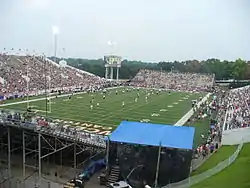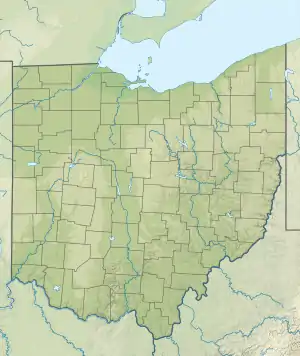Tom Benson Hall of Fame Stadium
Tom Benson Hall of Fame Stadium, formerly Fawcett Stadium, is a football stadium and entertainment complex in Canton, Ohio. It is a major component of Johnson Controls Hall of Fame Village, located adjacent to the grounds of the Pro Football Hall of Fame. The venue hosts the annual Pro Football Hall of Fame Game and serves as the home field for the football teams from Canton McKinley High School and Walsh University. It also served as the home field for Malone University from 1993 to 2018 and a number of other Canton-area high schools.
 Tom Benson Hall of Fame Stadium in 2006 | |
 Tom Benson Stadium Location in Ohio  Tom Benson Stadium Location in the United States | |
| Former names | Fawcett Stadium (1938–2015) |
|---|---|
| Location | 1835 Harrison Ave NW, Canton, Ohio, U.S. |
| Coordinates | 40.820°N 81.398°W |
| Owner | Johnson Controls Hall of Fame Village |
| Capacity | 23,000 |
| Surface | Natural grass (1938–1997) AstroTurf (1997–2016) Turf Nation (2016–present) |
| Construction | |
| Broke ground | 1924 |
| Opened | 1938, 83 years ago 2016 (re-opened) |
| Renovated | 2015–2016 |
| Construction cost | US$500,000[1] |
| Tenants | |
| Canton McKinley Bulldogs (1924–present) Hall of Fame Game (NFL) (1962–present) Walsh Cavaliers (NCAA) (1998–present) Lincoln Lions (1926–1975) Lehman Polar Bears (1932–1975) GlenOak Golden Eagles (1997–2006) Timken Trojans (1976–2014) Malone Pioneers (NCAA) (1993–2018) | |
First dedicated as Fawcett Stadium in 1938, the stadium's original name honored the memory of John A. Fawcett, a former Canton board of education member, who died several years before the stadium was completed.
On November 24, 2014, it was announced that Tom Benson, owner of the New Orleans Saints, would be donating $11 million to the Pro Football Hall of Fame, $10 million of which was to go into renovating Fawcett Stadium and recouping the money by renting use of the stadium to the Pups. In response to Benson's donation, the Hall of Fame announced that Fawcett Stadium would be renamed Tom Benson Hall of Fame Stadium,[2][3] which was dedicated on August 3, 2017. Benson died less than a year later, on March 15, 2018.
The renovation of Tom Benson Hall of Fame Stadium was part of the approximately $200 million construction completed in Phase I of the Johnson Controls Hall of Fame Village expansion project. [4] [5]
Construction
The stadium was built from 1937 to 1939 at an estimated cost of $500,000. The federal government in the form of manpower, the WPA, paid for $400,000 while a school board bond issue paid for the materials. The stadium originally seated 15,000 and was the largest high school stadium in the country at that time.
On the grounds of the facility was a park, aptly named "Stadium Park". This park still exists although presently is much more disjointed from the stadium as part of the park was used as the site of the Pro Football Hall of Fame and also because what is left of the park is separated from Benson Stadium by Interstate 77.[1]
Tom Benson Hall of Fame Stadium was constructed as a replacement for League Field, the city's previous stadium, where Canton's professional football team, the Bulldogs, played many of their games.
History
Tom Benson Hall of Fame Stadium seats 23,000 and has an NFL-caliber press box.[6]
Five Canton area high schools have played their football seasons on this field (McKinley Bulldogs, Lincoln Lions, Lehman Polar Bears, GlenOak Golden Eagles, and Canton Timken Trojans). Future Cleveland Browns great and Pro Football Hall of Famer Marion Motley, who along with fellow Hall of Famer Bill Willis broke the color barrier in modern professional football with the Cleveland Browns in 1946, scored the first touchdown in the stadium in 1938. Each summer, it hosts the annual Pro Football Hall of Fame Game, the first contest of the National Football League (NFL) exhibition season.
Malone University also previously utilized the stadium as their home field for football until the program was discontinued after the 2018 season.[7]
It is presently the home field for the McKinley Senior High School and Walsh University. The Ohio High School Athletic Association football state championship games were split between Fawcett Stadium and nearby Paul Brown Tiger Stadium in Massillon between 1991-2014, and all football state championship games were played at the stadium in 2017 and 2018.[8]
In 1997, the stadium underwent a major renovation and a name change. Backed by the Canton community, $4.3 million worth of improvements were completed on the stadium. Some of the major improvements included state-of-the-art Astroturf with a player friendly rubber base, new locker room facilities, new scoreboard with graphics display screen, new lighting, new sound system, new electrical services, structural repairs, vinyl caps for all wooden seats, and a renovated press box. The newly renovated facility was also renamed to include the words Pro Football Hall of Fame Field.[1]
From 1997 to 2000, Benson Stadium was the home of the Victory Bowl, the NCCAA championship football game. In 2002, The Sporting News rated Benson Stadium the number one high school football venue in America.[9]
In 2009, the stadium hosted the inaugural IFAF Junior World Championship of American Football. The tournament gathered 16 best national teams from around the world. It hosted the 2015 IFAF World Championship in 2015.
In 2020 and 2021, the Stadium will be the site of the NCAA Division III Football Championship. The Ohio Athletic Conference will be the host as designated by the NCAA.[10]
2015–16 reconstruction
After the 2015 Pro Football Hall of Fame game concluded, demolition began on the stadium. The construction limited fan seating during the fall football season. The final phase of construction was scheduled to begin after the 2016 Hall of Fame Game. However, approximately an hour prior to kickoff, the game was cancelled due to poor field conditions caused by the use of improper paints applied to the field to create the Hall of Fame logo and other on-field graphics.[11]
References
- "Fawcett Stadium". Football.ballparks.com. 1999-08-09. Retrieved 2013-09-07.
- "Tom Benson donates $11M to Hall" (Press release). Pro Football Hall of Fame. November 24, 2014. Retrieved August 18, 2015.
- Patra, Kevin (November 24, 2014). "Tom Benson makes $11 million pledge to Hall of Fame". National Football League. Retrieved August 18, 2015.
- "Pro Football Hall of Fame Village announces 'agreement in principal' on merger that could bring more cash to project". wkyc3.com. Retrieved 2 August 2019.
- "Pro Football Hall of Fame Village delays frustrate neighbors in Canton". wkyc3.com. Retrieved 1 August 2019.
- http://www.neworleanssaints.com/news-and-events/article-1/Tom-Benson-Hall-of-Fame-Stadium-dedicated/08afb78d-4525-477a-8b0e-53536b68dd7a
- https://www.ohio.com/sports/20190201/malone-university-dropping-football-program-amid-restructuring
- https://www.ohsaa.org/sports/history/ft/state_results.htm
- "Canton McKinley Football - Stadium and Facilities". Cantonmckinley.com. Archived from the original on 2013-01-31. Retrieved 2013-09-07.
- https://www.ncaa.com/news/ncaa/article/2017-04-18/2019-2022-future-diii-ncaa-championship-sites
- "No home games for McKinley in 2016". FridayNightOhio.com. September 2, 2015. Retrieved November 12, 2015.
See also
- "Fawcett Stadium history". Times Reporter. 2015-06-02. Retrieved 2016-12-02.
| Wikimedia Commons has media related to Tom Benson Hall of Fame Stadium. |
| Events and tenants | ||
|---|---|---|
| Preceded by first stadium |
Home of the Victory Bowl 1997 – 2000 |
Succeeded by Ernest W. Spangler Stadium |